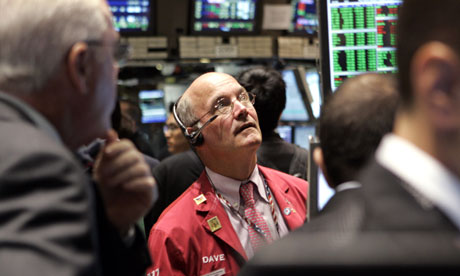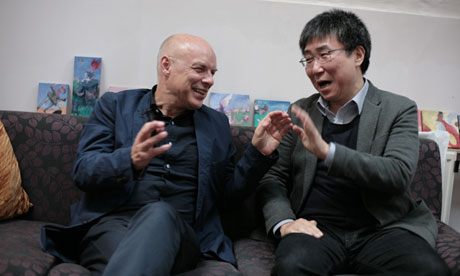It's a very
Brian Eno notion: rather than submit to a normal interview, the 64-year-old polymath wants to talk about his new album through a conversation with the economist
Ha-Joon Chang. Inevitably, the discussion, which takes place in Eno's office in Notting Hill, London, barely touches on the record,
Lux; instead, it ranges over another of his new creations (an app called Scape), the value of art, and why numbers are like sausages. We also cover the real reason why rightwing Americans won't admit that the war in Iraq was a mistake.
Eno met Chang through an editor at the latter's publisher. The 49-year old economist is something of a star in that
increasingly starry calling, ever since the publication of his 23 Things They Don't Tell You About Capitalism – a book
described by the Guardian as "a masterful debunking of some of the myths of capitalism". Born in South Korea and now teaching at Cambridge University, Chang admits to being a fan of early Roxy Music – but, as soon becomes apparent, he and Eno have more in common than that.
Brian Eno: There's an issue we're both interested in – this middle ground between control and chaos. Some economists say you can only have a control model or a chaos model, that you're either a socialist or it's all about the free market. Whereas you say: "Let's find a place in between."
This happens to be an issue with the music I make. It's made for a place somewhere between architecture and gardening. It's not a situation where I'm finessing every tiny detail. I basically set a process in motion and then watch it happen. A lot of the design work is prior to the thing starting, rather than trying to keep control of it once it has started. You try to design the process carefully enough so you get the results you want and don't have to intervene.
Ha-Joon Chang: That's the approach I use in my economics. Central planners thought they could control everything, but there are always elements of uncertainty and surprise. But they then try to control even those. At the other extreme, we have those free-market economists who think there need to be no rules – even that it's OK to kill your competitor. Then you have a system that runs amok because everyone is cheating everyone in trying to beat them. The illusion that this rule-less system can organise itself has been proven completely mistaken – but we still have people wanting to believe in these extremes.
BE: And people saying, well, if you don't believe in that one, you must believe in this one.
HJC: I've read quite a few readers' reviews of my book on Amazon, saying, "Ah, he criticises the free market, he advocates central planning." I don't do that for a minute! But this is our black and white, dichotomous way of thinking – which has really been harmful.
BE: One of the things you're doing when you make art, apart from entertaining yourself and other people, is trying to see what ways of working feel good, what feels right. What gets the results you want? And for me, it isn't top-down architecture that does that – but it's not chaos, either. I don't want to do free jazz! Because free jazz – which is the musical equivalent of free marketeering – isn't actually free at all. It's just constrained by what your muscles can do. It turns out that anything that is called free anything isn't really. It's just constraints that you don't recognise.
HJC: It's a point I make in my book, when I say there's no such thing as a free market. The argument being that in all markets, there are some rules about what you can trade, how you can trade. We think some markets are free only because we totally accept those underlying rules. We just don't see them any more.
BE: You talk about child labour, don't you?
HJC: That's right. In the 19th century, a lot of people were against outlawing child labour, because to do so would be against the very foundations of a free market economy: "These children want to work, these people want to employ them ... what is your problem? It's not as if anyone has kidnapped them ... " But today even the most rightwing economists don't advocate bringing child labour back, because they've got to accept the idea that children have the right to enjoy their childhood and a proper education.
BE: This turns out to be something that happens a lot. Once you've grown to accept something and it becomes part of the system you've inherited, you don't even notice it any longer. We don't even think that not employing children is anti-free market.
So whenever you talk about the free market – or free jazz! – what you really mean is "constrained by rules that we've stopped thinking about". This seems a long way off music, but when you set out to make something, you might just inherit all the ways of making it. If you're a Tin Pan Alley songwriter, you don't question the fact that there are 84 notes on the piano. You're not bothered by the fact that you can't get in between two of them – these are just the ground rules of the working situation. But I did want to question something about composition, and not
just because I am a disagreeable sort of person, but because I noticed I liked music that wasn't made by either of these sets of rules. It wasn't command-economy music and it wasn't free-market music. It wasn't top-down architecture, and it wasn't free jazz. I'm referring in particular to things in the mid to late 60s like Terry Riley's piece
In C. Have you heard of this piece?
HJC: No.
BE: It's a very interesting example of some very simple rules that produce something very rich. There's a score, and there are 52 bars, and each bar is a slightly different phrase in the key of C. It can be played by any number of musicians, and the rule is that they all start together, all playing to the same tempo, and they keep playing the first bar as many times as they want – each one. But then when you want – say you're playing clarinet – you can move on to bar two, and then you keep playing bar two. And then when you want to move on to the third bar ... well, the piece starts to separate out, and if there are 20 musicians, they might all be playing a different bar, but on top of one another, and it's all in C, so everything works together. So the piece has this beautiful characteristic: it starts out in unison, and gradually it becomes richer and richer and richer. And then they all have to end together, so they gradually converge back.
To make that piece by top-down writing would be impossible … but it's very beautiful.
HJC: And it's different every time?
BE: Yes. That's important. So this is one of the things that the composer has to accept: he or she can't precisely predict the outcome. This is what command economy people have trouble with.
HJC: Exactly.
BE: They're not happy with uncertainty.
Caspar Llewellyn Smith: You talk about a top-down process, and I can imagine what you mean with a composer – someone like Mozart, or even Riley … but where does something like folk music fit into this?
BE: Closer to Riley, I would say. There you have certain musical memes that get passed around, and never faithfully copied. That's the interesting thing. He hears a tune of mine, and thinks, "Oh, that's good, I'll play that." But his version is going to be different from mine. It's very genetic, actually. Whereas classical music was supposed to be perfectly replicable: the score was the ultimate authority.
CLS: Ha-Joon, presumably every economist has their own idea of how the world should be organised. So isn't it a very real problem when politicians come along, with their own agendas, and screw everything up?
HJC: Oh yeah, but my view is that we don't live by bread alone. We have to accept political considerations, and cultural and social considerations …
These days, economics has become such an all-encompassing way of thinking that everything is supposed to justify its existence by how much money it makes. Are you making enough money as a university? Are you making enough money as a classical orchestra? I think it's a fundamentally wrong approach to life. Because economics might be the foundation, if you like … but if you try to create a world in which everything is driven by money and the market, the world will be a much poorer place.
Imagine if all those kings and dukes hadn't commissioned those crazy cathedrals, paintings and music … we'd still be living in sticks and mud. Because none of those things made any economic sense. Human beings' capacity to "waste time" is a miracle – but that's exactly what art is for.
BE: Ha-Joon came up with a good title for a book that I might write: "A Total Waste of Time"!
CLS: Are these questions increasingly urgent, because over the course of the last couple of decades, that rightwing mindset has won out – we have rightwing figures now who, 20 years ago, would have been beyond the pale?
HJC: Absolutely. These ideas have penetrated so deeply into our society, it's poisonous.
BE: It's not only money, it's also other forms of accountability. Look at education in this country. I've just had two daughters go through the system here, and nothing mattered at all, as long as they could get through their A-levels. It doesn't matter if you don't actually understand a word. I could see some of their friends who were good at remembering things, but had no clue at all about what they were talking about, who got A stars.
HJC: In that system, curiosity is actually a great disadvantage. Which means that any creativity gets lost.
BE: It's to do with the act of quantification. It's part of the money thing: something that you can put a figure to immediately assumes a sort of authority, even if it doesn't deserve it.
What is the value of a park? You can't quantify it. We keep them because we've inherited them. But I'm sure there'll be a rightwing movement in the future that says, "Parks? What are they for? People just wander about in them – and there's dog shit all over the place. What's the point of that? A great big piece of real estate in the middle of London that could be generating income – we can quantify that." Quantification is a big temptation for society because it looks like control.
HJC: People tend to think that numbers are quite objective, but numbers in economics are not like this. Some economists say they're like sausages: you don't know what they really are until you cut into them. Once you know, you become very sceptical ...
I'm not against numbers. You need some numbers, to work with. Life would be impossible otherwise. But we've made these numbers into fetishes.
Of course, the more obscure a number is, the more people tend to think it is objective. If you say that the average American goes through three tubes of toothpaste a year, they kind of believe you. But if you say it's 3.72 tubes, they think: "Wow – that must be correct."
Art is not the only area affected by this quantification – education has been affected, family relationships, too – but I think art is the most endangered area of life. It's not obvious how something makes money. Sometimes, you have an artwork that you think is terrible, but then some billionaire is prepared to pay a huge amount for it, and suddenly it becomes valuable. And you are supposed to like it because it's expensive, and it must be expensive because it's worth it. So even the values within the art world are distorted.
BE: When I went to art school, the choice was to enter the art world or the pop world, and a lot of my teachers were disappointed I took the pop route because they thought I was a promising fine artist. But one of the reasons I did is because I thought it was inherently healthier. It had a quasi-democratic basis that the art world doesn't have at all. Tom Wolfe says something in his book The Painted Word about how four curators, 12 collectors and six critics determine an artist's career. Something like that.
This is why the art world has such incredible inertia, because once those people have invested their highly important opinion in something, they're very unwilling to change it. Whereas if you've bought an album by a band but then you don't like their second one, you just say, fuck it, the second one isn't any good.
CLS: And of course, today, you wouldn't even buy that record, you might just stream it.
HJC: Once again, you have to strike a balance between control and the market. Without some very rich guys a lot of great art would never have existed – so control isn't necessarily bad. But if you have only that, then art stagnates; it rots, if only a few powerful people are in charge. So you need a combination.
Your way of encouraging people to make their own music with your new app,
Scape, is a good example of a different sort of approach to working.
BE: You drag shapes on to a screen to create a picture, and each shape has its own sound, with its own set of hidden rules. For instance, "when a lot of things are happening at once, I'm going to default into another mode of playing"; or "I only play in the evenings" – that sort of thing. Each piece of music becomes a little musical ecology.
HJC: I've been a big fan of your music over the years. When I was growing up in South Korea in the 70s and early 80s, the country was too poor to buy original records. Everything was bootlegged. The sound would be terrible: we used to call them tempura shop records – it sounded as if someone was deep-frying them.
This new album,
Lux, was originally created for a specific space in Turin [the Great Gallery of the Palace of Venaria]. It's very interesting to think of a building as something more than just a physical structure: it's also about its surroundings, its light, and its sound. People don't tend to think of this, but our sense of a building can really be affected by its sound.
BE: Especially with this building, because it has the longest reverberation you can imagine. You snap your fingers, and the sound goes on for 11 seconds. It's a gallery connecting two palaces, actually. It's about 100 metres long, 15 wide and 10 high and any sound you make in there just spreads ... Treating sound as a physical material was only really possible from the time of recording onwards. As soon as people started making recordings, they took sound out of time and put it into space. It goes from being transitory and ephemeral to being something you can almost handle. I call that the materialisation of music. So everything I've been doing, really, has been to do with realising sound can be a material: if you're now thinking about a building, this can be one of the materials you can consider.
CLS: Ha-Joon, what do you make of the success in the west now of Korean pop:
K-pop?
HJC: Gangnam Style! Initially a lot of it was really bad imitation of what was going on in Britain and America, but now they've found their own voice. Watch this space, because I think there'll be more interesting stuff coming out of it.
BE: Nearly everything good starts from imitation.
HJC: It's actually a good illustration of how art can be done in a very non-hierarchical way. The success of this guy, Psy, is because he didn't try to protect his work too much: he let everyone copy and create their own versions. So you have
versions with Voldemortfrom Harry Potter ... my children are hooked on finding Matrix versions. Some are actually brilliant!
BE: It's a brilliant idea to make something that, like a module, can be plugged into any part of the culture.
CLS: Ha-Joon, in your book you write about different varieties of capitalism.
HJC: One of the general themes is that there are many different ways of organising the system. Different countries do things in different ways. Types of capitalism have different strengths and weaknesses. The problem is that in the last 30 years, we've been told there's only one way of organising capitalism, and it's the American-style free-market way. Countries are put under pressure and they have to rely on, especially if they're poor, foreign aid from rich countries, or they have to borrow money from the IMF. It's one of the reasons this crisis has happened.
There have been a lot of discussions about what needs to change, but there's been a lot of resistance, and popular sentiment hasn't been as coherent as it would have been in an age with strong trade unions and so on.
I'm not too hopeful. But if not now, when? If you can't learn the lessons from the biggest financial crisis in three generations, then we have a problem.
CLS: Ought culture try and shape the debate, or is that not its role? Brian, you've taken a stand on a number of political issues.
BE: I think the way culture changes things is slightly different from that. I've always disliked propaganda and shied away from artists' using their ability to manipulate emotional triggers – which is what artists do - in support of a political message, because I think it's a trick. I would like people to agree with me because they agree with my arguments, not because I'm good at music. So if I take a position publically, of course I get attention because I'm known through my music, but I don't try to support the position in that way.
Culture does change the way we think, just not in the propagandistic way. Art can be a model of how otherwise something could be done. How else it could be? When you see a piece of art, and you think, "Wow, that's wonderful", part of you wants to know, "And how did it get to be that way? Ah, it got to be that way by that mechanism. This is how it's done."
To give you an example of something I don't particularly respond to myself: Jackson Pollock was the expression of a philosophy, and that philosophy said, "If I just let it all come out of here and I'm not going to try to control it all, that's going to work." I don't particularly agree with it. But that picture is a way of thinking about that idea. And very often a work of art is a way of looking at the outcomes of an idea. It's very clear in novels – in fact, the most clear example is in science fiction: you describe a world, and you try to describe how if things were like that, they would turn out. That "what if?" question is a central question that makes human beings successful creatures. We are capable of saying what if this, and what if that, and comparing those outcomes. We love that question, and art is one of the ways we keep rehearsing our ability to answer it.
HJC: It's a great point. The problem is more with the way people think and not the content of it. Human beings are very prone to this black-and-white dichotomous thinking, so if you're a socialist country you allow no market and squash any dissent, if you're a capitalist country you're supposed to – although in fact, many countries don't – you're supposed to put profit and economic growth before any human values. But paradoxically, these two ways of thinking are the same, in the sense that they have this one grand principle to which they are willing to sacrifice everything. This is why when many communists give up communism, they become ardent free-market supporters.
BE: It's a cliche: the ex-Trot.
HJC: I know quite a few ex-Trots who work in the IMF. So if you understand art in the same way Brian does, it gives you the ability to think about alternatives, think about possibilities.
BE: It allows you to think about uncertainty. One of the characteristics of people, whether on the left or the right, is that they can't tolerate uncertainty. They don't want a system with any leaks in it. They want to think they're capable of battening everything down – and if only people would fucking stick to the rules, it would work. When those systems don't work, it's always because, in their opinion, somebody didn't play the game correctly.
HJC: Yes, it's never their principles that are wrong, it's the people who are the problem.
BE: This is why so many rightwing Americans still say Iraq would have been a good war, if only we had sent in more troops in the beginning, if only we'd done this or we'd done that … They will not admit that Iraq wasn't a good war.
CLS: There is explicitly political art – look at the case of Pussy Riot at the moment, for example. So there's a range of ways of going about things.
BE: Well, of course there's a complete spectrum. Although I do often wonder how much of the politics of Pussy Riot the people who support them understand.
HJC: As a consumer, I don't create art, but I think whatever the message is, art has to touch you. I like all kinds of music – classical, pop, rock, electronic. Somehow, as a consumer, you know when something is good and when something is bad.
CLS: It's interesting that you use the word "consumer" – that we live in a world now in which art is something you consume, not something you practise. Art becomes a ready-made lifestyle.
HJC: Yes, but I took two years of piano lessons when I was seven and eight, and that was it.
BE: That's more than I took.






 Comment
Comment

